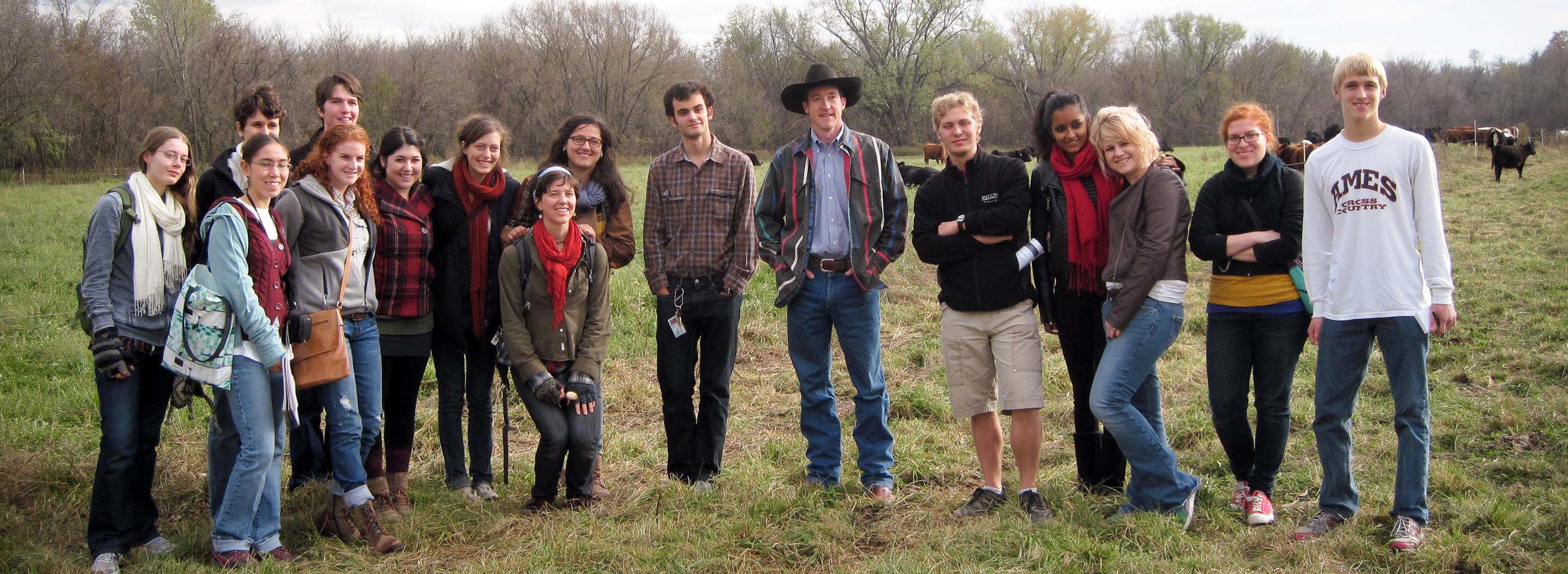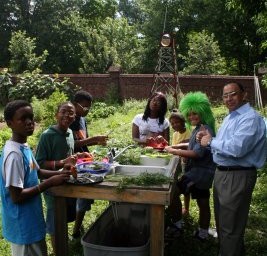by Dayna Burtness, Midwest Fellow During my first few weeks as a fellow, I made the somewhat painful decision not to return to manage the college farm I co-founded at my alma mater, St. Olaf College in Northfield, MN. STOGROW farm is in its fifth successful season selling produce to the Bon Appétit cafe on campus, but its development is limited by the five student farmers having to stretch themselves between farming and classes during the spring and fall. I was all set to move to Northfield–a delightful small town an hour south of Minneapolis–at the end of my fellowship, help the farm expand up to several acres, and live happily ever after selling veggies to Bon Appétit as the STOGROW lead farmer. The only problem was that even though Northfield is home to great […]

The Bon Appétit Blog
+ Blog Categories
Introducing the Student Garden Guide!
- Blog
Midwest Fellow Dayna Burtness introduces the new Student Garden Guide developed by Bon Appétit Management Company. The guide will help students just starting farms as well as those who want to take their student garden to the next level. A must-read! Download your copy here: http://www.circleofresponsibility.com/page/354/student-garden-guide.htm
Social Change Today and Awareness
- Blog
(This vlog was inspired by a conversation I had with my cousin last week.) Part of our job as Fellows this year is going to be speaking with students at universities and trying to raise awareness about issues of food sustainability. I’m excited about this aspect of our job because I’ve always been a big believer in raising awareness. But I have to admit that I often find myself asking whether raising awareness is really the best way to make social change happen. The fact is, in today’s world we’re all very busy… So does that mean we’re too busy to spend time trying to change our world? Or are activists correct in believing that if you can just get the information out to people, they’ll care, and they’ll do something about it?
Understanding labor issues on farms
- Blog
Midwest fellow Dayna Burtness shares her excitement and concerns about delving into labor issues on farms in Bon Appétit Management Company’s supply chain.
Preeti Mistry Shares Thoughts On Top Chef and The Power Of Fresh Produce
- Blog
Leaving the Top Chef competition, I could not help thinking how much of a struggle it was to cook without fresh vegetables and herbs that were not available in the Air Force Base kitchen. It made me think of the challenges many Americans face to find fresh produce and healthy ingredients, and the sad results for the nation’s health. I run an industrial size kitchen feeding 2500 people a day, and despite the size and scope of the operation I manage, everything we put on the table to feed our guests is made from scratch. The Air Force Colonel had made it clear that these were some of America’s finest Airmen and Airwomen. He told of their extensive travels abroad that have enlightened their palates — yet sadly the kitchen walk-in refrigerator at the base had very little fresh produce […]
“The Real” Bon Appétit
- Blog
I ate Bon Appétit food at WashU in St. Louis for four years—and I guess my accumulated knowledge of Bon Appétit by the time I graduated just goes to show that just because you put something in your mouth doesn’t mean you know a THING about it. So here are my very first impressions of “the Real Bon Appétit”…of finally diving into the “real world”, and the truth about salmon…
Meet Midwest Fellow Dayna Burtness
- Blog
Hey everyone! I’m Dayna Burtness, the new Midwest Fellow for the Bon Appétit Management Company Foundation. Carolina and I will be vlogging and blogging here over the next year about our experiences working with chefs, farmers and college students across the country. Check back weekly for updates or subscribe to our RSS feed.
East Coast Fellow’s Thoughts on a Broken Food System
- Blog
My name is Carolina Fojo—I’m the new East Coast Fellow for Bon Appétit Management Company! I just graduated in May 2009 from Washington University, St. Louis. I majored in Anthropology (and no, I was not digging for bones, and I promise it makes sense that I’m doing what I’m doing for Bon Appétit now ;0) … Here’s a quick vlog about my experiences with Fair Trade, and coffee farmers, which should explain why I’m thrilled to be working at Bon Appétit this year.
A Student’s View on Farming
- Blog
After reading Nina's blog posts about working on a student garden guide, Sierra Bintliff, a student at Wesleyan University, was moved to write in about her student farming experience: When I received an email last winter—through a farming listserv organized by Wesleyan University students—about interning for Bon Appétit on a small organic farm at St. Joseph’s College, I was thrilled at the opportunity to work for the summer in Maine for a company whose mission statement embodies the ideal combination of my two passions: sustainability and food. As a Wesleyan student I both enjoyed the food provided by Bon Appétit’s talented kitchen staff and worked as a Bon Appétit catering employee. There I experienced the genuine enthusiasm of the Bon Appétit community for providing quality food from sustainable sources. St. Joseph’s College and Bon Appétit’s combined objective for this summer […]

Camp Kumquat: Teaching Farm to Fork to the Next Generation
- Blog
I am currently compiling research about student gardens that sell their produce to the Bon Appétit café on campus. This is a trend that is becoming more and more prevalent around the country. By growing their own food and selling it to Bon Appétit, students are learning about sustainable and local agriculture and providing their campus with food that is, in many cases, grown right on the other side of the green! While doing my research, the unique initiative of one student garden really stuck out to me. I hope you are as touched by it as I was. Jen Swanson and Katie Anderson (or Dragonfly and Chestnut as they are known at the Burning Kumquat student farm at Washington University in St. Louis) both studied abroad in eco-villages in India and Scotland, respectively. When they returned to school, they […]